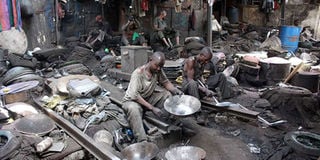Build local industries to create jobs

Jua Kali traders at Kamukunji market in Nairobi on July 21, 2019. We have enormous potential in this country. PHOTO | FILE | NATION MEDIA GROUP
What you need to know:
- We, politicians and public servants, should facilitate the private sector and entrepreneurs to bake the national cake.
- Leadership — visionary, committed, focused leadership that harnesses the other factors — is key to any successful enterprise.
We all want a country that works, which is globally competitive and one that’s ready for business and investment. But what have we done as leaders to get that going?
The role of public sector leadership is to facilitate good policies, create an enabling environment for investment and ease of doing business.
The role of corporate leaders is to invest and be innovative, so that our businesses can compete globally.
Over the years, some corporate executives and captains of industry have made great sacrifices to create opportunities for our people to earn a living and to create wealth.
Above all this, they pay the taxes which finance the public sector.
LEADERSHIP
In political language, they are the bakers of the national cake. Without them, there would be little or nothing for us to share — and that is why we have to treat them with kid gloves.
We, politicians and public servants, should facilitate the private sector and entrepreneurs to bake the national cake.
We should make it easy for them to access public services without red tape and ‘kitu kidogo’.
We should fight for them to have greater access for our goods and services in the global market.
People are the most important investment in any business. While the other factors of production — land, capital and technology — are key, labour (people) is the most important.
However, I dare say leadership is the one factor missing from the list.
EFFICIENT
Leadership — visionary, committed, focused leadership that harnesses the other factors — is key to any successful enterprise.
A good employer will focus on getting the best out of the people who work for them.
You train them, build their capacity, expose them to new methods, motivate them and recognise and reward them so that they can give you their best.
You give them tools, especially technology, to be efficient.
A good employer should foster teamwork to ensure there is no silo mentality in the workplace and that there is seamless flow of work.
That goes hand in hand with proper planning and setting of targets. The targets must be costed, with continuous monitoring and evaluation to ensure the work is on course.
A good employer will ensure employees operate in a safe and healthy environment and improve their welfare.
EQUALITY
Special attention should be given to women, especially new mothers, and persons living with disability. Workplace gender ratio balances, gender equality and gender parity should be observed.
However, we are all aware of the huge challenge of unemployment in our country. A large number of young men and women are pounding the pavements and knocking at factory doors looking for jobs.
As President Harry Truman famously said, “progress occurs when courageous, skilful leaders seize the opportunity to change things for better.”
In February last year, about six months after I took office, I went to India to market our green grams in an initiative dubbed ‘Ndengu Revolution’.
There, I toured Brandix Apparel City in Visakhapatnam City, where all the world-renowned designer apparel brands were being made for export to Europe and America.
JOB CREATION
Surprisingly, the employees were of very low academic levels but they still produced high-quality garments.
I saw an opportunity. I took the courage to set up an ultra-modern apparel factory in Kitui, which we have named the Kitui County Textile Centre (Kicotec).
We began construction in April last year and procured sewing machines.
We have identified and trained village boys and girls who have hardly gone beyond primary school from our 40 wards who are now producing uniforms for national government administrators.
Just consider this data from the Economic Survey 2019: in 2017, our trade deficit was Sh1.13 trillion.
LABOUR FORCE
In 2018, this increased to Sh1.147 trillion. Some of the commodities that we imported in 2018 include: rice worth Sh42 billion; maize worth Sh12 billion; sugar, molasses and honey worth Sh22 billion; second-hand clothes worth Sh16 billion; furniture worth Sh8.8 billion; all worth more than Sh100.8 billion!
With these figures, you can see the amount of simple jobs that we are exporting annually and leaving our young people vulnerable.
We need to think and act more radically in order to create opportunities for those who have been left out of employment and protect those holding precarious informal sector jobs.
We have enormous potential in this country. We have a country endowed with great natural resources, hardworking people and an excellent global positioning.
We have a huge labour force out there which can be utilised to turn around this country. Let’s tap it.
Ms Ngilu is the Governor of Kitui County




